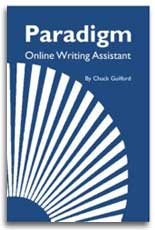Analysis and Synthesis
Analysis refers to dividing a whole into parts. Synthesis refers to the process of constructing a whole from an assortment of pieces.
Read more ...Basic Punctuation
Punctuation need not be mysterious or problematic. The number of punctuation marks is small, and once mastered, they become tools that help shape your meaning and vary the rhythms and patterns of your sentences.
Commas, periods, and apostrophes are three basic marks you can't get along without. Quotation marks, also, are often necessary. First master those four, then move on to the others.
Read more ...Designing Effective Sentences
Basic Sentence Concepts explains the subject-verb/complement pattern and shows how you can expand that pattern almost indefinitely with a few simple principles such as coordination and subordination. Now we'll look at some more advanced sentence strategies. Again the aim is to increase your versatility as a writer, to help you see the full range of options for solving writing problems. As your flexibility increases, you'll not only satisfy minimal standards of clarity and correctness, you'll express yourself with new-found energy and power.
Read more ...Occasions for Informal Essays
A thoughtful letter to an old friend, a reflection on your education or ethnic heritage, a childhood reminiscence—these could all be informal essays. In writing, informality depends less on subject or structure than on the writing context. Informal essays assume a personal stance. They suggest close connections among writer, reader, and subject.
Read more ...Trying Out Ideas
By now, your project should be well underway. You've got a subject that genuinely interests you, and you've found a focus to guide your explorations. Now you need to begin systematically probing and exploring.
Read more ...Form: Tradition and Innovation
By now, you've probably amassed many notes and ideas for your argument, but you may be wondering how to sort and organize this material into an essay. The following pattern, which gives the traditional Latin names for each section, may help. Like the thesis/support pattern, it offers a basic structural framework that can be modified for various writing contexts. The essential parts include the Introduction, Statement of the Case, Proposition, Refutation, Confirmation, and Conclusion.
Read more ...Develop Your Paragraphs
Your topic sentences indicate the major support areas for your thesis, and the guide sentences show how you can develop each paragraph. Still, your paper is far from complete. While you've opened up your main idea to expose its parts, you have yet to get down to giving the specifics, the precise details that will help your reader feel the full weight of your thought. You must show the foundation of specific evidence that your general ideas are built upon. The following suggestions for paragraph development will help you coax forth details that will make your writing solid and substantial.
Read more ...



